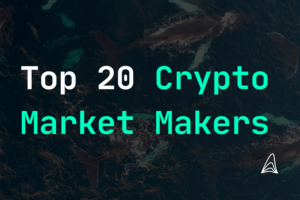
Proof of Stake - Consensus Mechanisms in Crypto
- Jakob Brezigar
- Last updated: 11.March 2024
- Reading time: 4 min
Imagine if becoming a cryptocurrency mogul was as easy as lounging on your sofa, your digital coins working hard in the background like a team of diligent elves mining away. Well, welcome to the world of Proof of Stake (PoS), where your crypto earns its keep not by brute force but by proving its loyalty. In essence, PoS is a consensus mechanism that allows blockchains to operate more energy-efficiently, with validators chosen based on the amount of cryptocurrency they hold and are willing to “stake” as collateral.

Table of Contents
What is Proof of Stake (PoS)?
Proof of Stake is a consensus mechanism in blockchain technology where validators are chosen to create new blocks based on the amount of cryptocurrency they hold and are willing to lock up as stake, offering a more energy-efficient alternative to Proof of Work.
How does Proof of Stake benefit crypto market makers like Orcabay?
Proof of Stake allows market makers to contribute to network security, earn rewards, and reduce operational costs by staking their assets, enhancing liquidity and stability in the crypto markets.
Why is Proof of Stake considered more energy-efficient than Proof of Work?
Unlike Proof of Work, which requires significant computational power to mine new blocks, Proof of Stake achieves consensus through staking, drastically cutting down on the energy consumption and environmental impact of blockchain operations.
In the evolving landscape of cryptocurrency, consensus plays a pivotal role in maintaining the integrity and security of decentralized networks. These mechanisms are foundational protocols that verify transactions and ensure all participants in a cryptocurrency network agree on the validity of all the transactions. Without these mechanisms, digital currencies could not operate in a trustless environment. Among these mechanisms, PoS and Proof of Work (PoW) stand out as two of the most influential and widely adopted methods. By requiring validators to own and stake cryptocurrency as a form of security deposit, PoS offers a more energy-efficient alternative to the computationally intensive PoW, marking a significant shift in how consensus is achieved in the blockchain world.
Key Takeaways
Proof of Stake (PoS) offers a more energy-efficient alternative to Proof of Work (PoW), reducing blockchain’s environmental impact.
In PoS, validators are chosen based on their stake in the cryptocurrency, aligning their interests with the network’s long-term health.
PoS democratizes the validation process, lowering barriers to entry and potentially reducing the risk of network centralization.
Crypto market makers like Orcabay utilize PoS to secure networks, earn transaction rewards, and reduce operational costs.
Adopting PoS has led to significant operational cost savings for Orcabay, demonstrating tangible benefits for crypto market makers.
Understanding Consensus Mechanism
Consensus mechanisms are the backbone of blockchain technology, providing a democratic way to agree on the state of a distributed database without the need for a central authority. This innovative approach to achieving consensus across a network of disparate parties marks a departure from traditional centralized systems, introducing a level of security and fairness that underpins the cryptocurrency industry. By allowing for the decentralized and transparent validation of blockchain transactions, consensus mechanisms ensure the integrity of the blockchain while preventing fraud and double-spending.
What Is a Consensus Protocol?
A consensus protocol is a set of rules and processes that network participants follow to validate new transactions and blocks, thereby achieving agreement on the blockchain’s current state. These protocols are critical for maintaining the decentralized nature of cryptocurrencies, ensuring that all transactions are accurately recorded and that the blockchain remains tamper-proof. Among various consensus protocols, PoS and PoW have emerged as two primary methods, each with its own set of advantages and challenges in terms of security, efficiency, and environmental impact.
Deep Dive Into Proof of Stake (PoS)
What Is Proof-of-Stake (PoS)?
PoS represents a fundamental shift in the consensus mechanism landscape, prioritizing energy efficiency (goal of not using as much energy) and stake over computational resources. In a PoS system, the probability of validating a new block is not determined by one’s computational resources but by the number of coins the validator holds and is willing to “stake” as collateral. This approach significantly reduces the energy consumption associated with blockchain validation, making PoS a more sustainable and environmentally friendly alternative to Proof of Work (PoW).
Understanding Proof-of-Stake (PoS)
PoS systems incentivize participants to behave honestly by requiring them to lock up a portion of their holdings as stake. This stake acts as a form of security deposit, with validators risking loss of their stake for dishonest behavior. This mechanism not only secures the network but also aligns the validators’ interests with the long-term health of the blockchain, encouraging them to act in ways that maintain the network’s integrity and reliability.

How Does Proof of Stake work?
In PoS, the process of creating new blocks is often referred to as “forging” or “minting,” rather than mining. Validators are randomly selected to create a new block based on the size of their stake and sometimes other factors, such as the length of time they have held their stake. This selection process ensures that the opportunity to validate transactions and earn rewards is more evenly distributed among participants, reducing the likelihood of centralization and improving network security.
Reducing Computational Power With Proof of Stake
PoS significantly reduces the need for extensive computational power, a hallmark of the energy-intensive Proof of Work system. By shifting the focus from mining to staking, PoS not only lowers the environmental footprint of blockchain networks but also democratizes participation. Validators are selected based on their stake, not their ability to solve cryptographic puzzles, thereby ensuring a more sustainable and inclusive approach to securing cryptocurrency networks.

Mining Power in Proof of Stake
The term “mining power” takes on a different meaning in the context of PoS. Instead of requiring vast amounts of computational power, mining power in a PoS system is derived from the size of one’s stake in the network. This paradigm shift not only democratizes the process of block validation but also significantly lowers the barrier to entry for participants, as it removes the need for expensive and energy-intensive mining equipment.
Comparing Proof of Stake to Proof of Work
Comparing PoS to PoW reveals stark differences in their approach to achieving consensus. While PoW relies on computational power to solve complex mathematical puzzles for the right to add new blocks to the blockchain, PoS uses validators’ stakes as a measure of their commitment to the network. This fundamental difference means that PoS is inherently more energy-efficient than PoW, as it eliminates the need for energy-intensive mining activities. Furthermore, PoS offers improved security features, such as penalizing dishonest validators by slashing their stakes, which helps deter attacks, like the 51% attack, on the network.

What Is a Proof-of-Work Consensus Protocol?
PoW is a consensus mechanism that requires participants to expend computational power to solve cryptographic puzzles in order to validate transactions and create new blocks. This process, known as mining, ensures the security and decentralization of the network but at a significant cost in terms of energy consumption. PoW has been criticized for its environmental impact, prompting the search for more sustainable alternatives like PoS.
Proof of Stake Vs. Proof of Work
The debate between PoS and PoW centers around trade-offs in security, decentralization, and environmental impact. While PoW is proven to secure networks effectively, its high energy consumption has led to concerns about sustainability. PoS, on the other hand, offers a more energy-efficient solution but faces skepticism regarding security and the risk of centralization through the accumulation of large stakes. Nonetheless, the shift towards PoS by major cryptocurrencies indicates a growing consensus on its potential to balance security with environmental considerations.
Why Is Proof of Stake Seen as an Upgrade From Proof of Work?
Proof of Stake is often regarded as an upgrade from Proof of Work due to its lower energy requirements, reduced risk of centralization, and enhanced scalability. By aligning validators’ incentives with the network’s long-term success and reducing the environmental footprint of blockchain technology, PoS presents a forward-looking approach to achieving consensus in a more sustainable and equitable manner.

Conclusion: Proof of Stake (PoS) in Crypto: Here's What it Means
PoS marks a significant evolution in the world of cryptocurrency, offering a greener, more equitable consensus mechanism that promises to shape the future of blockchain technology. As the industry continues to grow and evolve, the adoption of PoS by leading cryptocurrencies signals a shift towards more sustainable and user-friendly blockchain networks. By reducing the environmental impact of digital currencies and democratizing the validation process, Proof of Stake stands at the forefront of a new era in cryptocurrency, one that values sustainability, security, and inclusivity.
Disclaimer: The information provided in this article is for informational purposes only and does not constitute financial, investment, or other professional advice. All opinions expressed herein are solely those of the author and do not represent the views or opinions of any entity with which the author may be associated. Investing in financial markets involves risk, including the potential loss of principal. Readers should perform their own research and consult with a licensed financial advisor before making any investment decisions. Past performance is not indicative of future results.

Jakob Brezigar
Jakob, an experienced specialist in the field of cryptocurrency market making, boasts an extensive international presence. With Orcabay, he has skillfully managed major operations and deals for a wide array of global stakeholders.



